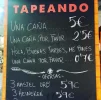D
Deleted member 84269
Guest
Use Spanish Words/Phrases For the Camino de Santiago
Esto -This Click this link for to hear pronunciation:
You've walked all morning through a smattering of sleepy villages where everything was frustratingly closed. Not a shop, bar or cafe open anywhere.
Then you see a sign in the woods "Panadería - Bakery 1km." All of a sudden you're no longer dragging your feet and thinking of eating the lizards. You're skipping along dreaming of a tasty Spanish pastry.
You bounce through the bakery door, see what you want but words fail you because you don't know the name of the thing begging to be eaten in Spanish. That is when you unleash this beautiful word that'll get you what you want.
"¡Esto!" You cry drooling at the mouth and pointing at the object of your desire on display. You say it ten times because you're so hungry you eat ten of them.
Ampolla - Blister
Click this link for to hear pronunciation:
That dreaded hot spot has started to burn your heel and ball of your foot.. The longer you go on, the more it bites away at your precious energy.
You gingerly peel off your socks in the courtyard of the albergue and your worst fears are confirmed - a callous callus is staring you in the face. Better get it seen to before it turns radioactive.
The word you'll need in the chemist is ampolla. Say it with sad eyes and sucking air through your teeth like you're in pain.
With any luck you'll get served by a lovely lady like I did who'll give you what you need. I was given strict orders to dress them in bandages doused in antibiotic cream every day before walking and apply disinfectant on the blisters to sanitise them when finished for the day.
Tapones - Ear plugs
Click the link to hear pronounciation: https://www.howtopronounce.com/spanish/tapones/
After rigorously rehearsing a sentence I’d pieced together using my Spanish phrasebook, I strode into a pharmacy with the confidence of a local, flamenco stamped at the counter and hit the lady behind the counter with it.
‘Las cosas para enchufar aquí– the things for plugging in here,’ I requested, sticking my fingers in my ears. They'd get the message surely?
The señora standing by the till gave me a look of horror like I’d just asked her to pull out a nostril hair. Without saying a word she scurried out back and returned with a colleague.
I repeated my request to her colleague.
‘Eeengleesh pleez,’ she pleaded equally stumped.
‘Earplugs,’ I said, sticking my fingers in my ears again.
With all becoming clear she pulled a set off a hook behind the counter and I thanked them for their patience.
Later on I found out from a Canadian who spoke fluent Spanish that I’d actually asked them to electrocute me through my ears.
Tapones, she informed me, was the magic word that would keep me out of future trouble. It could stop you from being electrocuted too and give you a good night's sleep at the albergue.
To read the full blog post, learn more handy Spanish words and read more pilgrim ponders go to:
https://caminosantiagoblogcom.wordpress.com/blog/
Thanks for reading
Last edited by a moderator:





















